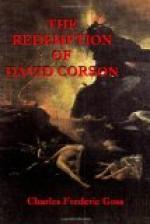By a short, swift revulsion, his feelings changed from horror to indifference. “After all, why should I care?” he said. “The boy is nothing to me, and at any rate he would have gained his end in some other way. Let him have his fling; I have had mine. If he didn’t break that old impostor’s heart, he would probably break a better one! And as for the gypsy—it’s only a question of who and when. What a fool I have made of myself! Who would believe that such a trifle could give me such a shock? There is something to live for yet. I must see what sort of a face the quack makes when he takes his medicine to-morrow.”
He threw the iron weight into the water, entered the cabin, took another drink, smiled contemptuously at the drunken wretches under the table, crossed the deck, descended the gang-plank and climbed the steep path to the city.
Against his inheritance from such a nature as this, the young mystic had to make his life struggle.
CHAPTER XVII.
THE SHADOW OF DEATH
“There are moral as well as physical assassinations.”—Voltaire.
When he awoke the next morning, the poor bedeviled doctor crawled back to the hotel as best he could, his head throbbing with pain, his wits dull and his temper wild. Stumbling up the long flight of stairs which seemed to him to reach the sky, he burst open his door and entered the room. It was empty. The bed had not been occupied. Pepeeta was nowhere to be seen.
It took him some moments to comprehend that he did not comprehend. Then he called, “Pepeeta! Pepeeta!”
The silence at first bewildered, then aroused hims and crossing the corridor he entered David’s room. It, too, was empty. He was now thoroughly astonished and awake. Recrossing the hall he once more entered his room and began in earnest to seek an explanation of this mystery. It did not take him long, for on the table were lying the jewels in which he had invested his profits and which he had confided to Pepeeta—and beside them a piece of paper on which he slowly spelled out these startling words:
“I have discovered your treachery and fled.”
“Pepeeta.”
He drew his hand across his eyes, took a piece of his cheek between his thumb and first finger and pinched it to see if he were awake, then read the words again, this time aloud: “I have discovered your treachery and fled. Pepeeta.” “Treachery?” he said. “What t-t-treachery? Whose t-t-treachery? Fled? Fled with whom, fled where? I wonder if I am still d-d-drunk?”
Laying the paper down, he went to the wash-stand, filled the bowl with water, plunged his head into it and expected to find that he had been suffering some sort of hallucination. But when he returned to the table and again took up the missive, the same words stared him in the face.
At last, and almost with the rapidity of a stroke of lightning, the whole mystery solved itself. It flashed upon his mind that Pepeeta had abandoned him, and in company with the man he had so implicitly trusted. The serpent he had nourished in his bosom had at last stung him! Tearing the paper into shreds, and stamping upon the floor, he cursed and raved.




